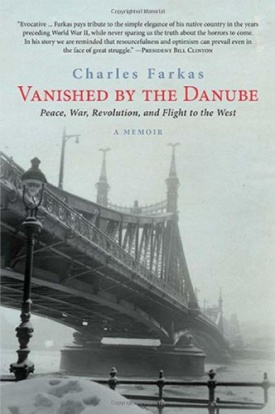 "Vanished by the Danube: Peace. War, Revolution, and the Flight to the West," by Dr. Charles Farkas. Germany’s invasion of Hungary in 1944 marked the end of a culture that had dominated Central Europe from the nineteenth century to the middle of the twentieth. In this evocative memoir, Charles Farkas offers a testament to this vanished way of life—its society, morality, personal integrity, wealth, traditions, and chivalry—as well as an eyewitness account of its destruction, begun at the hands of the Nazis and then completed under the heel of Soviet Communism. "Vanished by the Danube: Peace. War, Revolution, and the Flight to the West," by Dr. Charles Farkas. Germany’s invasion of Hungary in 1944 marked the end of a culture that had dominated Central Europe from the nineteenth century to the middle of the twentieth. In this evocative memoir, Charles Farkas offers a testament to this vanished way of life—its society, morality, personal integrity, wealth, traditions, and chivalry—as well as an eyewitness account of its destruction, begun at the hands of the Nazis and then completed under the heel of Soviet Communism.
Farkas’s recollections of growing up in Budapest, a city whose grandeur embraced—indeed spanned— the Danube River; his vivid descriptions of everyday life in Hungary before, during, and after World War II; and his ultimate fight to freedom in the United States, remind us that behind the larger historical events of the past century are the stories of the individual men and women who endured and, ultimately, survived them.
Charles Farkas has written his life story not as a Hungarian, but as a Hungarian American, which is to say that his memoir Vanished by the Danube is a kind of farewell to all that he and his family lost, but he is neither bitter nor mournful … this is the story of a lost world, but this is also a story about survival.” —from the Introduction by Margaret McMullan.
Reviews:
- “In his evocative new memoir, Vanished by the Danube, Charles Farkas walks us gracefully through the Hungary of his youth. Through stories that extract beauty from everyday events, Farkas pays tribute to the simple elegance of his native country in the years preceding World War II, while never sparing us the truth about the horrors to come. In his story we are reminded that resourcefulness and optimism can prevail even in the face of great struggle.”
- President Bill Clinton
- “This is an important addition to the history of one of the most violent chapters of the twentieth century, told by an eyewitness. Charles Farkas brings back those nightmare years at a crucial moment for Europe. We ignore their lessons at our peril.” - Kati Marton, author of "Paris: A Love Story"|
- “An extraordinary life, extraordinarily well told.” - Thomas Dunne, Publisher and Editor, Thomas Dunne Books
- “The great British-Hungarian author Arthur Koestler liked to tell of a conversation he had with an English journalist: ‘Oh, Mr. Koestler’—the journalist exclaimed—‘you have had a very colorful life.’ ‘No’—the author answered—‘it was only an East European life.’ The statement greatly applies to Charles Farkas’s autobiography: willy-nilly, he too underwent many adventures, some good some bad, but he always tells them with good humor and a profound understanding of human foibles. There is also great sympathy for the persecuted and the weak. All this is based on what seems to be a perfect recall of far-away events. The story relates more than just the disappearance of old social classes; it also recounts what can happen to a small country, Hungary, when squeezed between two imperialist powers.” — István Deák, author of "The Lawful Revolution: Louis Kossuth and the Hungarians, 1848–1849"
- Purchase the book on AHF's Amazon Store!

See [ALL AHF PUBLICATIONS]
[<< Back to Featured Members]
[<< Back to All AHF News]
| Purchase the book on AHF's Amazon Store! 
About Dr. Charles Farkas
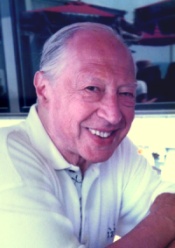 Charles Farkas was born in 1925 in Budapest, Hungary. In 1949, he earned a double doctorate in law and political science from the University of Pázmány Péter. After the failure of the 1956 Hungarian uprising, Farkas fled Hungary for the United States, where he received a master’s in library science from Columbia University. He went on to become director of the Briarcliff Manor Public Library, where he worked from 1968 until his retirement in 1996. He and his wife Edit live in Chappaqua, New York. They have four children and, as of early 2013, four grandchildren. Charles Farkas was born in 1925 in Budapest, Hungary. In 1949, he earned a double doctorate in law and political science from the University of Pázmány Péter. After the failure of the 1956 Hungarian uprising, Farkas fled Hungary for the United States, where he received a master’s in library science from Columbia University. He went on to become director of the Briarcliff Manor Public Library, where he worked from 1968 until his retirement in 1996. He and his wife Edit live in Chappaqua, New York. They have four children and, as of early 2013, four grandchildren.
Related Articles
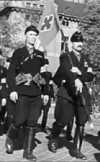 Further Reflections on 19 March 1944 and its Aftermath: A Perfect Storm of Tragedy and Folly: Regarding the history of the Hungarian Holocaust, two fundamental issues should be considered: the unacceptability of “whitewashing” or “cleansing” the Holocaust as well as the unacceptability of ”blackening” history by denying, omitting or belittling rescue initiatives and anti-Nazi activities in Hungary even after Nazi Germany invaded and occupied the country. [read more] Further Reflections on 19 March 1944 and its Aftermath: A Perfect Storm of Tragedy and Folly: Regarding the history of the Hungarian Holocaust, two fundamental issues should be considered: the unacceptability of “whitewashing” or “cleansing” the Holocaust as well as the unacceptability of ”blackening” history by denying, omitting or belittling rescue initiatives and anti-Nazi activities in Hungary even after Nazi Germany invaded and occupied the country. [read more]
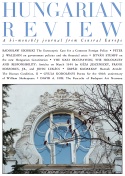 3/19/2014 - AHF article regarding the occupation of Hungary by Hitler on March 19, 1944 and its horrific consequences, entitled "Reflections on March 19, 1944 and Its Aftermath: A Perfect Storm of Tragedy and Folly." "We are concerned that a political agenda has replaced a debate based on historical facts relating to the Hungarian Holocaust and Nazi Germany's invasion and occupation of Hungary," said Frank Koszorus, Jr., the Federation's president. "We condemn not only whitewashing but the blackening of this historical record as well. Both forms of revisionism do a great disservice to the memory of the victims of evil and those who opposed it at a treacherous time in Hungary's history. These considerations prompted us to issue our statement," he added. [read more] 3/19/2014 - AHF article regarding the occupation of Hungary by Hitler on March 19, 1944 and its horrific consequences, entitled "Reflections on March 19, 1944 and Its Aftermath: A Perfect Storm of Tragedy and Folly." "We are concerned that a political agenda has replaced a debate based on historical facts relating to the Hungarian Holocaust and Nazi Germany's invasion and occupation of Hungary," said Frank Koszorus, Jr., the Federation's president. "We condemn not only whitewashing but the blackening of this historical record as well. Both forms of revisionism do a great disservice to the memory of the victims of evil and those who opposed it at a treacherous time in Hungary's history. These considerations prompted us to issue our statement," he added. [read more]
 3/20/2014 - Az Amerikai Magyar Szövetség üdvözölte a holokauszt-emlékév megrendezését: 3/20/2014 - Az Amerikai Magyar Szövetség üdvözölte a holokauszt-emlékév megrendezését:  Nyilatkozatban üdvözölte a magyarországi holokauszt-emlékév megrendezését Koszorús Ferenc, az Amerikai Magyar Szövetség (AMSZ) elnöke, rámutatva, hogy az eseménysorozat hozzájárul a korabeli Magyarország jobb megértéséhez. [tovább] Nyilatkozatban üdvözölte a magyarországi holokauszt-emlékév megrendezését Koszorús Ferenc, az Amerikai Magyar Szövetség (AMSZ) elnöke, rámutatva, hogy az eseménysorozat hozzájárul a korabeli Magyarország jobb megértéséhez. [tovább]
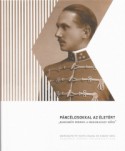 3/15/2015 - Book Signing in Budapest Honoring Holocaust Hero Col. Koszorus. On March 10, 2015, a book signing and reception introducing an excellent volume, "Armored Soldiers for Life: Ferenc Koszorus a Hero of the Holocaust" ("Páncélosokkal az életért: Koszorús Ferenc a Holokauszt hőse"), took place in Budapest. AHF was also a co-sponsor of the book. [read more] 3/15/2015 - Book Signing in Budapest Honoring Holocaust Hero Col. Koszorus. On March 10, 2015, a book signing and reception introducing an excellent volume, "Armored Soldiers for Life: Ferenc Koszorus a Hero of the Holocaust" ("Páncélosokkal az életért: Koszorús Ferenc a Holokauszt hőse"), took place in Budapest. AHF was also a co-sponsor of the book. [read more]
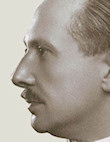 6/8/2012 - Hungarian Review publishes article, "The Soldier Who Saved the Lives of Budapest's Jews: Col. Ferenc Koszorus." The courageous intervention of Col. Ferenc Koszorus and his loyal First Armored Division on July 6, 1944 blocked the deportation of the more than 250,000 Jews of Budapest. In paying tribute to Col. Koszorus, former Congressman Tom Lantos, a survivor of the Holocaust, noted that the Koszorus intervention "permitted... Wallenberg, who arrived in Budapest on July 9, 1944, to coordinate his successful and effective rescue mission." 6/8/2012 - Hungarian Review publishes article, "The Soldier Who Saved the Lives of Budapest's Jews: Col. Ferenc Koszorus." The courageous intervention of Col. Ferenc Koszorus and his loyal First Armored Division on July 6, 1944 blocked the deportation of the more than 250,000 Jews of Budapest. In paying tribute to Col. Koszorus, former Congressman Tom Lantos, a survivor of the Holocaust, noted that the Koszorus intervention "permitted... Wallenberg, who arrived in Budapest on July 9, 1944, to coordinate his successful and effective rescue mission."
[read more]
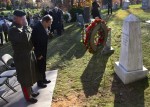 11/15/2014 - AHF, member organizations, and representatives of the Hungarian embassy in Washington DC placed flowers at the grave of Holocaust Hero, colonel Ferenc Koszorús, in Columbia Gardens Cemetery in Arlington. Koszorús, as the commander of Hungary’s first armoured division, thwarted a planned government coup dubbed the gendarmerie coup, which aimed to carry out the deportation of the Jews of Budapest on July 5 and 6 of 1944. [read more] 11/15/2014 - AHF, member organizations, and representatives of the Hungarian embassy in Washington DC placed flowers at the grave of Holocaust Hero, colonel Ferenc Koszorús, in Columbia Gardens Cemetery in Arlington. Koszorús, as the commander of Hungary’s first armoured division, thwarted a planned government coup dubbed the gendarmerie coup, which aimed to carry out the deportation of the Jews of Budapest on July 5 and 6 of 1944. [read more]
 6/12/2012 - In a related story, Heti Valasz publishes: "Emlékezzünk a magyar hősökre is! A Wallenberg-év lehetőségei": Mindent el kell követni, hogy Kelet-Európa valós második világháborús szerepe rögzüljön a nyugati és az amerikai köztudatban. [tovább] 6/12/2012 - In a related story, Heti Valasz publishes: "Emlékezzünk a magyar hősökre is! A Wallenberg-év lehetőségei": Mindent el kell követni, hogy Kelet-Európa valós második világháborús szerepe rögzüljön a nyugati és az amerikai köztudatban. [tovább]
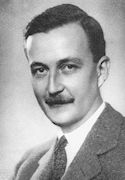 5/10/2013 - AHF publishes documents supporting the exoneration of Count János Esterházy (the only member of the Slovak Parliament in 1942 who voted against expelling the Jews, he was convicted on trumped up charges and died in a communist prison). The documents attest to his principled stand and actions to save Jews during World War II and protect the Hungarian minority in Slovakia, and includes letters from Simon Wiesenthal, Yad Veshem, and historians Dr. Magda Ádám and Dr. István Deák, Professor Emeritus from Columbia University. 5/10/2013 - AHF publishes documents supporting the exoneration of Count János Esterházy (the only member of the Slovak Parliament in 1942 who voted against expelling the Jews, he was convicted on trumped up charges and died in a communist prison). The documents attest to his principled stand and actions to save Jews during World War II and protect the Hungarian minority in Slovakia, and includes letters from Simon Wiesenthal, Yad Veshem, and historians Dr. Magda Ádám and Dr. István Deák, Professor Emeritus from Columbia University.
[read more]
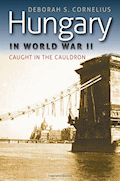 Hungary in World War II: Caught in the Cauldron by Deborah Cornelius, Fordham University Press, New York, 2011. Csaba Zoltani writes: "Deborah Cornelius’ Hungary in World War II: Caught in the Cauldron (Fordham University Press, New York 2011) gives an excellent overview of the events leading up to and the horrendous events of World War II in Hungary. The effect of the Treaty of Trianon, that without plebiscites, truncated Hungary and deprived it of its natural resources and forced a sizeable portion of its population to live under alien jurisdiction, set the political and sociological climate in Hungary from the 1920's on. [read more] or buy it now on AHF's Amazon Store! Hungary in World War II: Caught in the Cauldron by Deborah Cornelius, Fordham University Press, New York, 2011. Csaba Zoltani writes: "Deborah Cornelius’ Hungary in World War II: Caught in the Cauldron (Fordham University Press, New York 2011) gives an excellent overview of the events leading up to and the horrendous events of World War II in Hungary. The effect of the Treaty of Trianon, that without plebiscites, truncated Hungary and deprived it of its natural resources and forced a sizeable portion of its population to live under alien jurisdiction, set the political and sociological climate in Hungary from the 1920's on. [read more] or buy it now on AHF's Amazon Store! 
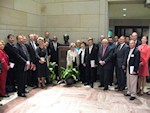 4/16/2012 - Raoul Wallenberg Remembered on Capitol Hill. U.S. Congressman Harris recalls Col. Ferenc Koszorus, Sr., Hero of the Holocaust. AHF honors the millions of lives lost and the untold suffering caused by Nazism and Communism. But even during the horrors of WWII, stories of resistance to Nazi atrocities emerged. When Hitler's patience ran out with the conservative leaders in Budapest and their peace-feelers
and contacts with Western allies, Nazi Germany invaded Hungary in March 1944, drastically
changing the situation of Hungary and the Jewish community. [read more] 4/16/2012 - Raoul Wallenberg Remembered on Capitol Hill. U.S. Congressman Harris recalls Col. Ferenc Koszorus, Sr., Hero of the Holocaust. AHF honors the millions of lives lost and the untold suffering caused by Nazism and Communism. But even during the horrors of WWII, stories of resistance to Nazi atrocities emerged. When Hitler's patience ran out with the conservative leaders in Budapest and their peace-feelers
and contacts with Western allies, Nazi Germany invaded Hungary in March 1944, drastically
changing the situation of Hungary and the Jewish community. [read more]
 3/23/2011 - AHF honors Col. Ferenc Koszorus, Sr., reflects on Holocaust Memorial Month. AHF honors the millions of lives lost and the untold suffering caused by Nazism and Communism. But even during the horrors of WWII, stories of resistance to Nazi atrocities emerged. [read more] 3/23/2011 - AHF honors Col. Ferenc Koszorus, Sr., reflects on Holocaust Memorial Month. AHF honors the millions of lives lost and the untold suffering caused by Nazism and Communism. But even during the horrors of WWII, stories of resistance to Nazi atrocities emerged. [read more]
 3/24/2009 - In 2009, as part of the Holocaust Memorial Month, the Embassy of Hungary sponsored the Carl Lutz and the Legendary Glass House in Budapest traveling exhibit in Washington, DC. The Carl Lutz Foundation, Hungarian American Coalition, Lantos Foundation for Human Rights and Justice, Mensch International Foundation and the Embassies of Switzerland and Israel are co-sponsors. The Federation believes it would be appropriate that the Embassy of Hungary, as a representative of all Hungarians, expand such exhibits to include Hungarian heroes of the Holocaust. [read more] 3/24/2009 - In 2009, as part of the Holocaust Memorial Month, the Embassy of Hungary sponsored the Carl Lutz and the Legendary Glass House in Budapest traveling exhibit in Washington, DC. The Carl Lutz Foundation, Hungarian American Coalition, Lantos Foundation for Human Rights and Justice, Mensch International Foundation and the Embassies of Switzerland and Israel are co-sponsors. The Federation believes it would be appropriate that the Embassy of Hungary, as a representative of all Hungarians, expand such exhibits to include Hungarian heroes of the Holocaust. [read more]
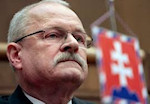 9/13/2011 - Slovak President shamefully calls Janos Esterhazy, a hero of the Holocaust, a follower of Hitler. AHF continues call for rehabilitation of Janos Esterhazy, reacts to Slovak falsification of history... Esterhazy was the only member of the Slovak Parliament in 1942 who voted against expelling the Jews, setting an example which few dared to follow in the parts of Europe controlled by Adolf Hitler's Germany. He was detained by the Nazis and died in a communist prison. He is still classified as a war criminal in Slovakia. [read more] 9/13/2011 - Slovak President shamefully calls Janos Esterhazy, a hero of the Holocaust, a follower of Hitler. AHF continues call for rehabilitation of Janos Esterhazy, reacts to Slovak falsification of history... Esterhazy was the only member of the Slovak Parliament in 1942 who voted against expelling the Jews, setting an example which few dared to follow in the parts of Europe controlled by Adolf Hitler's Germany. He was detained by the Nazis and died in a communist prison. He is still classified as a war criminal in Slovakia. [read more]
AHF History
Congressional Record
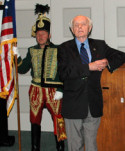 FERENC KOSZORUS: A HERO OF THE HUNGARIAN HOLOCAUST FERENC KOSZORUS: A HERO OF THE HUNGARIAN HOLOCAUST
HON. TOM LANTOS
(Extension of Remarks - May 26, 1994)
[Page: E1109]
HON. TOM LANTOS
in the House of Representatives
THURSDAY, MAY 26, 1994
(Tom Lantos, who died in February 2008 of esophageal cancer, was honored with the Presidential Medal of Freedom, the nation's highest civilian honor. He was also recipient of AHF's highest honor, the Col. Commandant Michael Kovats Medal of Freedom [read more])
- Mr. LANTOS. Mr. Speaker, this year marks the 50th anniversary of the Hungarian holocaust. I rise today to recognize one of the great heros of the Hungarian holocaust. Ferenc Koszorus, who at great personal sacrifice to his own life, saved thousands of Hungarian Jews from deportation to Nazi death camps.
- During the turbulent time in the summer of 1944, advancing Allied forces were closing in on Berlin while Hitler was racing to implement the final solution, the destruction of the Jewish race. There were many acts of heroic compassion and humanitarianism during this period. I would like to recount the story of Col. Ferenc Koszorus, one of the most remarkable examples of bravery and courage of the time.
- By June 1944, the Nazis had incarcerated and liquidated most of the Jewish population of Europe. In the capital of Hungary, Budapest, there remained approximately 250,000 Jews still alive. Budapest was still under control of the Hungarian police force. The Nazis believed that this force was not ruthless and brutal enough to deal adequately with the complete destruction of the large remaining Jewish population of Budapest.
- Ferenc Koszorus was a colonel in the Hungarian Army in charge of the First Magyar Armored Division stationed in and around Budapest. He learned that Laszlo Baky, Secretary of State and director of all security forces, with the exception of the army, had planned a coup d'etat to install a police force completely subservient to the Nazis. They would see to it that Hungary was purged of all remaining Jews.
- With the help of the Gestapo, Baky formed several battalions of `gendarmerie' forces loyal to him. Orders from the Regent to disband the gendarmerie went unheeded. Colonel Koszorus controlled the last remaining active army unit in Hungary. At a time when few others would stand up to the Nazi occupation, Colonel Koszorus took the initiative to resist.
- Realizing the severity of the situation, Colonel Koszorus consulted with the Regent and began preparations on his own to stop Baky and the gendarmerie battalions. On July 5, 1944 at 11:30 p.m., Colonel Koszorus ordered the units of the 1st Armored Division to take up positions at strategic points in Budapest, sealing off all road leading into the city. By 7:00 a.m. on July 6, 1944 all the units were in place and Colonel Koszorus informed Baky that if his gendarmerie did not leave and disband they would be destroyed. On July 7, 1944 Baky capitulated and evacuated his forces.
- Colonel Koszorus' unparalleled action was the only case known in which an Axis power used military force for the purpose of preventing the deportation of the Jews. As a result of his extraordinarily brave efforts, taken at great risk in an extremely volatile situation, the eventual takeover of Budapest by the Nazis was delayed by 3 1/2 months. This hiatus allowed thousands of Jews to seek safety in Budapest, thus sparing them from certain execution. It also permitted the famous Raoul Wallenberg, who arrived in Budapest on July 9, 1994, to coordinate his successful and effective rescue mission
- In October 1944, after the Germans had taken Budapest, Colonel Koszorus was forced into hiding to avoid certain execution by the Gestapo. While alive, Colonel Koszorus never received recognition of his actions. In 1991, Ferenc Koszorus was posthumously promoted to the rank of general by the Hungarian Government. His memory is honored with a plaque placed in the famous Dohany Street Synagogue in Budapest.
- Therefore it is with great honor and pride that I rise today in recognition valiant, patriotic efforts of Ferenc Koszorus. Many thousands of families are alive today as a result of the heroic actions of one man who stood up for his beliefs in a very uncertain and dangerous time. His loyalty to his country and love of humanity are an inspiration to all who struggle against oppression and the vile bigotry of racism.
- Too often the efforts of those who struggle against the Nazi oppression go unrecognized. This year, the 50th anniversary of Hungarian holocaust, the world reflects on the lessons learned. I am proud to honor Colonel Koszorus, a patriot, a humanitarian, and a hero.
[< back to all AHF news]
Join online!

|



